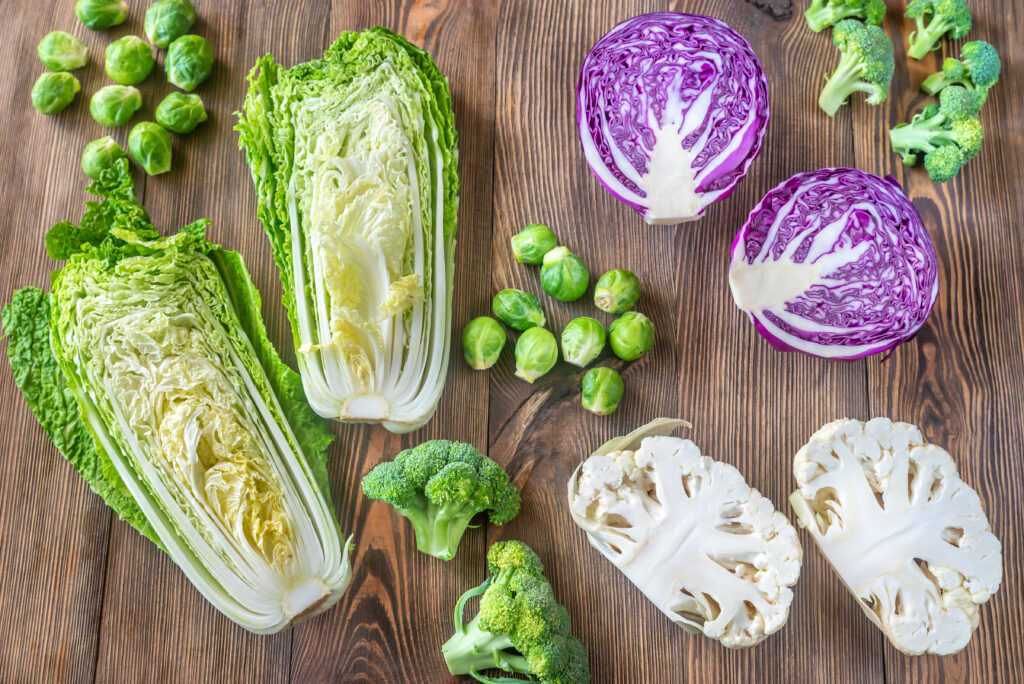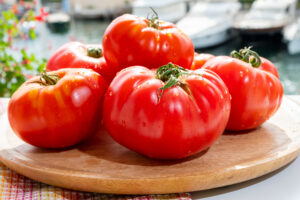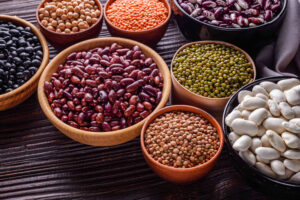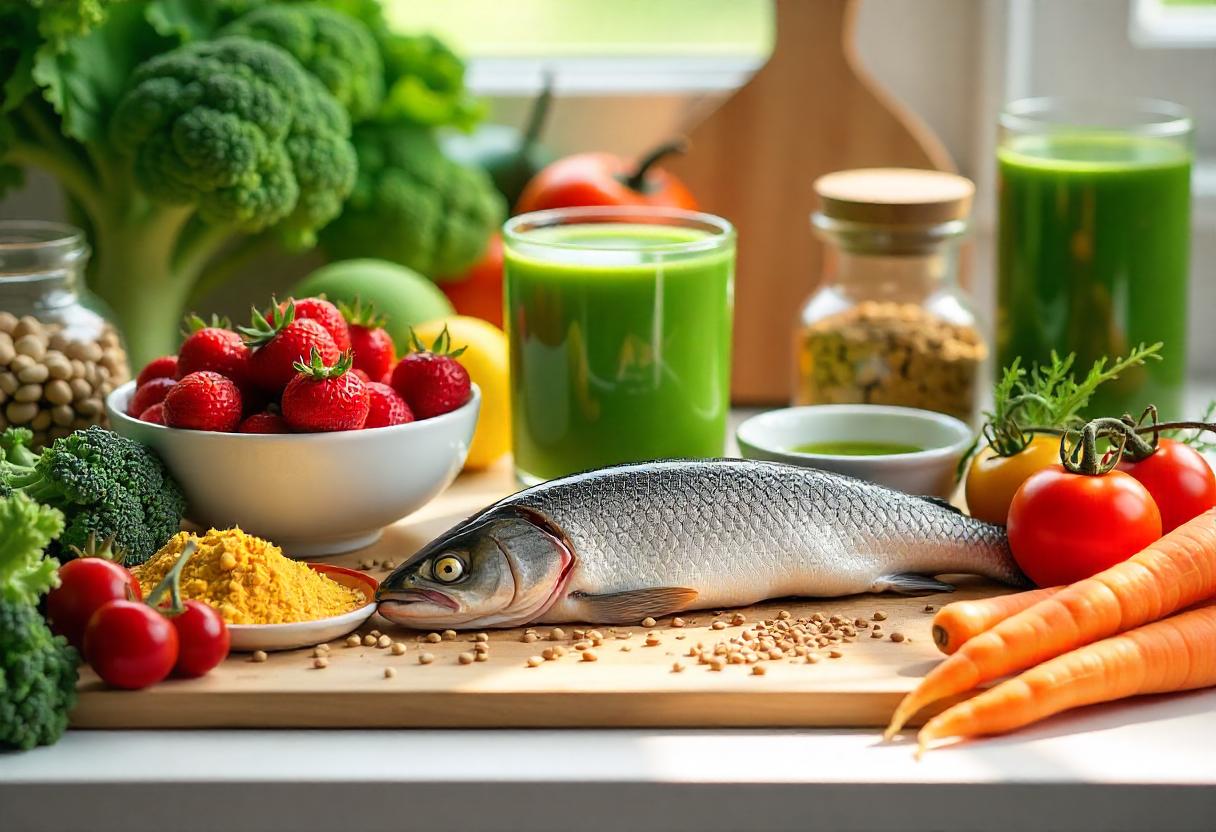Cancer is a complex disease influenced by many factors like genetics, lifestyle, alcohol consumption, tobacco intake, and unhealthy diet.
Its is estimated that 30–40% of all cancers can be prevented through a healthy diet, regular physical activity, and maintaining a healthy body weight. For certain types of cancer, this prevention rate may be even higher.
A varied diet rich foods may hinder the development of cancer and decrease its growth. These foods include fatty fish, vegetables, spices, beans, legumes, and fruits like berries.
These foods can drastically affect health and wellness, reducing the risk of chronic diseases like diabetes, heart diseases, cancer etc..
In this blog, we’ll explore some of the most effective foods that can help reduce cancer risk and promote overall health.
Foods to Reduce Cancer Risk
Although there is no one meal that will completely prevent cancer, including specific foods in your diet may help lower your risk of getting the disease.
1. Flax seeds
Flaxseeds are packed with nutrients like dietary fiber, omega-3 fatty acids, and lignans, which have estrogen-like properties and are considered more potent phytoestrogens than soy.
A review of animal and some human studies suggest flaxseed might reduce breast cancer risk, especially after menopause, but more trials are needed.
Other studies on flaxseed-rich diets have shown similar benefits, with one clinical trial even reporting its effectiveness in slowing the growth of prostate cancer cells in men.
However, a review of nine studies found a potential link between flaxseed oil intake or high blood levels of alpha-linolenic acid and increased prostate cancer risk. It is believed that the lignans in flaxseed are largely responsible for its anti-cancer benefits, meaning flaxseed oil without these lignans may not be as effective.
2. Cruciferous Vegetables
Cruciferous vegetables, such as broccoli, cauliflower, cabbage, and Brussels sprouts, contain sulforaphane, a compound that has anti-cancer properties.
Studies suggest that a higher intake of cruciferous vegetables is linked to a reduced risk of several cancers, including breast, bladder, prostate, and lung cancer.

A 2010 study found that eating more fruits, vegetables, and especially cruciferous vegetables may lower lung cancer risk. The strongest link was seen in smokers, especially former smokers. This may be due to isothiocyanates in cruciferous veggies, which help block smoking-related cancer effects, particularly in certain lung cancer types.
Broccoli sprouts are packed with sulforaphane, a compound that comes from the seed rather than developing as the plant grows. In fact, one sprout contains the same amount of sulforaphane as a full-grown broccoli plant.
Since sulforaphane is believed to have cancer-fighting properties, adding broccoli sprouts to an anti-cancer diet makes sense.
3. Berries
Berries like blueberries, strawberries, raspberries, and blackberries are rich in anthocyanins—powerful antioxidants known for suppressing cancer cell growth and reducing inflammation.
Black raspberries, in particular, are packed with phytochemicals like anthocyanins and ellagic acid, both with strong anti-cancer potential.
Studies suggest they help lower oxidative stress, inflammation, and tumor growth in cancers of the aerodigestive tract, colon, and more. Their immune-boosting and microbiome-friendly effects add to their protective benefits.
While research is still limited, their antioxidant-rich profile makes berries a valuable part of a cancer-preventive diet.
4. Chlorophyll
Chlorophyll, the green pigment in plants, plays a vital role in collecting light for photosynthesis. It also has unique health benefits, particularly in protecting against cancer-causing substances.
Chlorophyll and its derivatives can effectively bind harmful compounds like polycyclic aromatic hydrocarbons (from fuel combustion), heterocyclic amines (formed during grilling), and aflatoxin (a toxin from moldy foods like corn, peanuts, and soy products that can cause liver cancer), forming complex substances.
These chlorophyll-carcinogen complexes are harder for the body to absorb and are excreted through faeces, reducing the risk of harm.
Laboratory and animal studies support anti-carcinogenic effects of chlorophyll. Additionally, a clinical trial found a significant reduction in carcinogen complex in those who took chlorophyll daily.
Interestingly, chlorophyllin derivatives were detected in the blood of volunteers, suggesting it might have additional protective effects beyond binding toxins in the gut.
Adding a variety of chlorophyll-rich foods to your diet not only supports overall health but also complements the potential anti-cancer benefits of this powerful green pigment.
Foods high in chlorophyll include green beans, kale, dandelion, leek, lettuce, parsley, peas, and squash with spinach, broccoli, garden rocket, wild rocket wheatgrass (70% of its composition) being the richest sources.
5. Folate
Folate, an essential vitamin found in dark green leafy vegetables, plays a vital role in DNA methylation and synthesis.
Research suggests that getting enough natural folate from food may lower the risk of cancers such as colorectal, lung, breast, and bladder.
A lack of folate can lead to uracil—a component of RNA—being mistakenly incorporated into DNA instead of thymidine, causing strand breakage and mutations that may trigger cancer. Alcohol further increases cancer risk by interfering with folate metabolism, especially in those with low folate intake.
Folate intake may also mitigate cancer risk linked to family history, highlighting the importance of diets rich in dark green leafy vegetables, such as the Hallelujah Diet.
However, high doses of folic acid supplements—especially once precancerous cells are present—might actually promote cancer growth. Clinical trials show mixed results, often involving folic acid combined with other B vitamins, making it hard to isolate its specific effect. More research is needed to better understand the right dosage and timing for cancer prevention.
- Beef liver
- Spinach, asparagus, brussels sprouts, mustard greens, broccoli, lettuce
- Black-eyed peas, green peas, kidney beans
- Avocado
- Oranges and orange juice
6. Tomatoes

Lycopene, a powerful carotenoid, is especially protective against prostate cancer.
Tomatoes, especially when cooked, are rich in lycopene—a powerful antioxidant linked to reduced prostate cancer risk.
Studies show that high lycopene intake from tomatoes, sauces, or juices may significantly lower prostate cancer risk, with even greater protection against advanced stages. Clinical trials also report reduced tumor growth and DNA damage.
A meta-analysis of 119 studies found that people with higher lycopene intake or blood levels had a lower risk of overall cancer and cancer-related death. Lycopene, mainly from tomatoes, was especially linked to reduced prostate and lung cancer risk and mortality.
Since most of these studies were done in Western countries, the results may not apply to everyone around the world. More research is needed to confirm these findings in different populations.
7. Fatty Fish
Fatty fish like salmon, mackerel and sardines are rich in vitamin D, omega-3 fatty acids, these two nutrients have anti-inflammatory properties and may reduce the risk of certain cancers, like colorectal, breast cancer.
A study on Korean women found that eating more fatty fish may lower the risk of breast cancer. Women with higher intake of fish-based omega-3s (EPA and DHA) had a reduced risk, especially after menopause. The findings suggest fatty fish may help protect against breast cancer.
Consume atleast two servings of fatty fish in a week to reap their potential health benefits.
8. Green Tea
Green tea is packed with powerful antioxidants, particularly epigallocatechin-3-gallate (EGCG), which may help reduce cancer risk by combating oxidative stress, inhibiting tumor growth, and modulating detoxifying enzymes. Research suggests it may protect against cancers of the breast, lung, colon, and prostate.
A large Japanese study that followed over 100,000 adults for 19 years found that women who drank more than five cups of green tea daily had a 55% lower risk of kidney cancer compared to those who rarely drank it.
However, not all findings are consistent—some studies found no significant link between green tea intake and colorectal, breast, or esophageal cancer.
Still, enjoying a cup of green tea between meals or as a refreshing morning drink could be a simple step toward better health and potentially lower cancer risk.
9. Turmeric
Turmeric contains curcumin, a powerful compound known for its anti-inflammatory and antioxidant properties.
In cellular and animal studies, curcumin has shown promising anticancer effects against several types of cancer, including breast, liver, lung, gastric, and prostate cancers. It has been found to interfere with cancer cell growth and spread, trigger cancer cell death, and even increase free radical production—leading to oxidative stress that can destroy cancer cells.
Clinical trials also offer promising, though mixed, results. Some studies suggest that curcumin may enhance treatment outcomes in breast, cervical, and prostate cancers—especially when used alongside conventional therapies like radiation or chemotherapy.
However, not all trials show significant effects, likely due to the complexity of cancer and the variations in study design. More research is still needed to fully understand curcumin’s potential in cancer therapy.
One of the key reasons behind the mixed results of curcumin in clinical trials is its low bioavailability, meaning the body doesn’t absorb it well. However, pairing curcumin with black pepper—which contains piperine—can boost its absorption by up to 20 times.
To enjoy turmeric’s health benefits, consider adding 2–3 grams of turmeric powder to your daily meals and other foods. It not only adds flavor to your curries but may also support overall wellness.
10. Beans

Beans are an excellent source of various nutrients such as fiber, protease inhibitors, phytic acid, and polyphenols such as tannins, which may reduce the risk of cancer.
The high fiber content in beans may also help fight against colorectal tumors and colon cancer.
A meta-analysis of 14 studies with over 1.9 million people found that eating more legumes was linked to a lower risk of colorectal cancer, especially in Asians and with soybeans. More well-controlled studies are needed to confirm this.
Clinical and preclinical studies suggest that beans—and their bioactive compounds like quercetin and ferulic acid—may help reduce the risk of several cancers, including colorectal, breast, prostate, gastric, lung, oral cancer, and leukemia.
Consuming 2-3 servings of beans in a week can boost fiber intake and may decrease the risk of colorectal cancer as suggested by clinical studies.
11. Carrots
Carrots contain antioxidants like carotenoids, which may help reduce the risk of certain types of cancer.
In a 18-year study of 57,053 Danes, eating more than 32 grams of raw carrots daily was linked to a 17% lower risk of colorectal cancer, while eating less than 32 grams showed no significant benefit compared to not eating raw carrots.
Another 25-year Danish study of 55,756 people found that eating raw carrots regularly was linked to a lower risk of lung and possibly pancreatic cancer, but not breast or prostate cancer. Cooked carrots had no effect, likely due to heat-sensitive compounds.
Including carrots or carrot juice in your diet can boost your carotenoid intake, which may help reduce the risk of certain types of cancer. However, raw carrots may be especially beneficial for colorectal cancer due to their fiber content.
12. Nuts and Seeds
Nuts and seeds are rich in antioxidants, high in fiber, healthy fats and phytochemicals, vitamins and minerals, all of which may contribute to cancer prevention.
A 2023 review found that eating just 5 grams of nuts per day was linked to a 25% lower risk of colon cancer, 3% lower risk of lung cancer, and 6% lower risk of pancreatic cancer. Additionally, consuming 28 grams of nuts daily may reduce the risk of cancer-related death by 21%. What’s more, regular nut intake may also improve survival rates among patients with colorectal, breast, and prostate cancer.
However, further research is needed, particularly to explore more cancer types, including rare ones, and the impact of diet before and after diagnosis.
Foods That Increase Cancer Risk
Though having a healthy lifestyle with nutrient-rich diet and exercise, certain foods may contribute to increased cancer risk, such as:
- Over consumption of Calories
- Excessive Alcohol
- Red and Processed Meats
- Low-Fiber Foods
- Foods that elevate blood glucose levels
- Refined Sugar and Refined Flour Products
Closing Thoughts
Although adding these foods to reduce cancer risk in your diet may help, it is still important to keep a balanced diet full of fruits, vegetables, healthy grains and lean meats.
In addition to nutrient-rich diet, maintaining healthy weight, regular exercise, abstaining from tobacco use and moderation in alcohol intake are all important lifestyle choices that help in the prevention of cancer and general well-being.
Therefore, we can conclude that small changes in the diet can yield significant health benefits in the long run. Eat nutritious food and make choices to support a healthier, cancer-free lifestyle.
Remember, these foods cannot be considered a medical prescription for cancer. Cancer is a dangerous disease, if you think you have any symptoms of it, or suffering from it, consult the doctor for personal assistance and specific recommendations based on your unique set of medical needs.
You might also consider looking into
10 Health Benefits of Green Tea with Lemon
10 Super Foods That May Increase Testosterone
